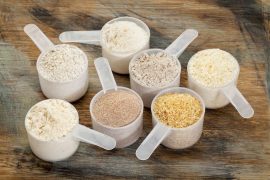Diabetic patients who use insulin along with their meals are aware of the importance of counting carbohydrates accurately. However, many are unaware that proteins also have an impact on blood sugar level. Therefore, it is also necessary to determine their dose of bolus insulin for proteins.
Gluconeogenesis
Gluconeogenesis is a process where our bodies produce glucose out of non-carbohydrate sources. Unlike the carbohydrates that are broken down quickly into glucose, conversion of protein to glucose takes place several hours. Thus, it can have a more considerable effect on the glucose level.
It is believed for a long time that the rate of gluconeogenesis is often stable. As a matter of fact, recent studies show that the changes in the gluconeogenesis rate are based on a patient’s diet. Those who follow a diet of low carbohydrate may need to administer insulin for protein. Although some proteins are converted to glucose, the rate of this process is higher under the circumstances where only little carbohydrates are consumed.
So how do you determine if you need to inject more insulin for protein? This actually requires careful observation of the blood glucose trend after every meal.
(..continue to the next page to find out)





